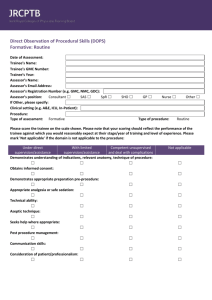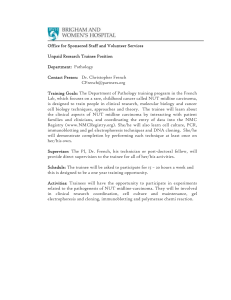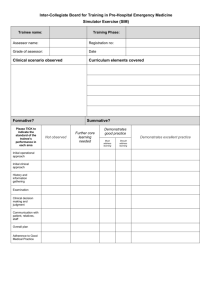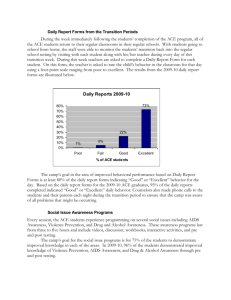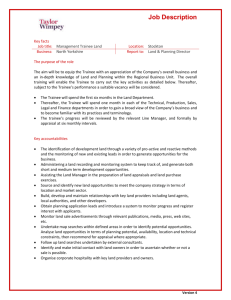Mini-Assessed Clinical Encounter (mini-ACE)
advertisement
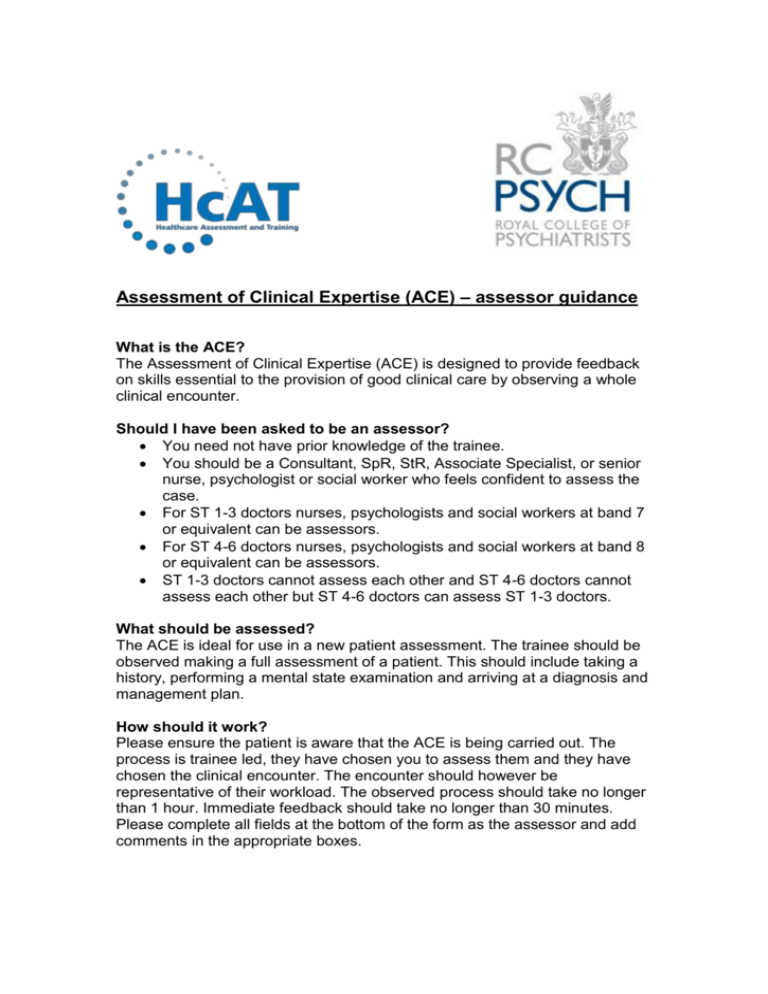
Assessment of Clinical Expertise (ACE) – assessor guidance What is the ACE? The Assessment of Clinical Expertise (ACE) is designed to provide feedback on skills essential to the provision of good clinical care by observing a whole clinical encounter. Should I have been asked to be an assessor? You need not have prior knowledge of the trainee. You should be a Consultant, SpR, StR, Associate Specialist, or senior nurse, psychologist or social worker who feels confident to assess the case. For ST 1-3 doctors nurses, psychologists and social workers at band 7 or equivalent can be assessors. For ST 4-6 doctors nurses, psychologists and social workers at band 8 or equivalent can be assessors. ST 1-3 doctors cannot assess each other and ST 4-6 doctors cannot assess each other but ST 4-6 doctors can assess ST 1-3 doctors. What should be assessed? The ACE is ideal for use in a new patient assessment. The trainee should be observed making a full assessment of a patient. This should include taking a history, performing a mental state examination and arriving at a diagnosis and management plan. How should it work? Please ensure the patient is aware that the ACE is being carried out. The process is trainee led, they have chosen you to assess them and they have chosen the clinical encounter. The encounter should however be representative of their workload. The observed process should take no longer than 1 hour. Immediate feedback should take no longer than 30 minutes. Please complete all fields at the bottom of the form as the assessor and add comments in the appropriate boxes. Specific points Please use the full range of the rating scale. A description of a performance that warrants a 4 can be found by clicking on the relevant part of the form. Comparison should be made with a doctor who is ready to complete the relevant stage of training. This is because point 4 of the scale represents satisfactory performance for completion of that phase of training (ST1, 3, or 5), so a doctor having only recently entered that phase might be making perfectly satisfactory progress, yet only obtain ratings of 2 or 3. There is an item asking “How would you rate the trainee’s performance at this stage of their training?” This item was introduced to prevent trainees becoming despondent at receiving only low ratings, and to give a measure of their ongoing progress. For example, this allows you to reflect that whilst not satisfactory based on expected attainment at the end of ST3, the trainee’s performance is satisfactory for their current stage in ST2. Descriptions of the 6 aspects of clinical care can be found be clicking on the relevant part of the form. Assessors are not always able to observe all 6 aspects of clinical care set out on the rating form. If this occurs, you are asked only to fill in the sections on the form where you have had a chance to assess the trainee sufficiently to make a judgement. If you are not able to assess that aspect please mark the box u/c (unable to comment). In order to maximise the educational impact of using an ACE, you need to provide appropriate feedback after the assessment and help the trainee to identify strengths and agree areas for development. This should be done sensitively and in a suitable environment. How to complete an ACE You can complete an ACE online at: http://www.hcat.nhs.uk/rcpsych You will be required to complete a few registration details if you have not already done so. Before you can complete an online assessment for any trainee they must be registered with the system via the Royal College of Psychiatrists website.Collated feedback for the whole year will be provided for each trainee at the end of the year.

